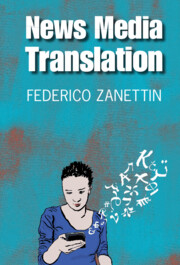Book contents
- News Media Translation
- News Media Translation
- Copyright page
- Contents
- Figures and Table
- Acknowledgments
- Introduction
- 1 Putting News Media Translation into Perspective
- 2 Translation as News
- 3 Approaches to News Media Translation
- 4 Ethnomethodology and News Media Translation
- Conclusion
- Appendix A
- References
- Subject and Name Index
4 - Ethnomethodology and News Media Translation
Published online by Cambridge University Press: 29 October 2021
- News Media Translation
- News Media Translation
- Copyright page
- Contents
- Figures and Table
- Acknowledgments
- Introduction
- 1 Putting News Media Translation into Perspective
- 2 Translation as News
- 3 Approaches to News Media Translation
- 4 Ethnomethodology and News Media Translation
- Conclusion
- Appendix A
- References
- Subject and Name Index
Summary
In this chapter, I introduce a novel approach to the study of news translation, which is intended to complement the various approaches surveyed in Chapter 3. Ethnomethodology is a field of sociology that focuses on conduct as the foundation of social order and studies “the commonsense resources, procedures, and practices through which the members of a culture produce and recognize mutually intelligible objects, events, and courses of action” (Heritage 1993, p. 856). An ethnomethological approach to news media translation is concerned with an analysis of the conventionally available textual options that orient the reader to understand a text as an objective reproduction of reality. How does a specific textual realization – for instance, a translation – make it possible to understand a newspaper article as a commonsense account of reality, and how is this account different from a very similar account of the same event – i.e., the source text(s) for the translation? While this chapter focuses on translation products and detailed textual analysis, ethnomethodology has also clear implications for process research, in that it can also be used to investigate workplace practices and routines (Perrin et al. 2017, p. 468).
- Type
- Chapter
- Information
- News Media Translation , pp. 133 - 184Publisher: Cambridge University PressPrint publication year: 2021



